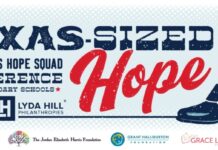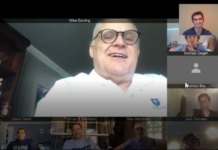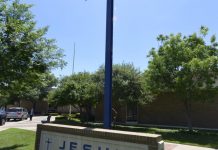With spring break one day away, many Jesuit students are already mentally checked out from their day-to-day work at school. And with sandy beaches, placid lakes, and, most importantly, cozy beds on the near horizon, most students have stopped giving thought to the long-term developments of Jesuit. These are problems for our post-vacation selves, they reason.
Although they will also enjoy a break next week, Jesuit’s administrators have kept exceptionally busy to keep the wheels of the school moving. Besides managing day-to-day operations, they have made major strides recently in shaping Jesuit’s long term plans; on Tuesday, for instance, principal Tom Garrison hosted a student council discussion about suggested cafeteria renovations.
On Wednesday, March 7, eight The Roundup staffers were able to catch up with a busy Mr. Garrison for a press conference. The writers peppered Garrison on topics ranging from big construction projects to the recently announced jeans day this Friday. Below is the transcription of the interview.
Clark Durham ’12: In [Dr. Degen’s] homeroom, we heard you allude to a meeting with student council you had yesterday to discuss cafeteria changes. Was the discussion a fruitful endeavor, and if so, what changes were suggested?
Mr. Garrison: It was brief, but I would say it was fruitful. The cafeteria is one of the last places that is still original equipment around here. It was designed with exact specifications for what we wanted it to do at the time. Part of the cafeteria was going to be the band hall, which would put a heavier load on the floor, so the structural piers were bigger and closer together. Another part was going to be an informal dining area, so the piers were smaller and more spread out. The reason that that’s important is because you can’t put a pier where there already is one.
So what we found early [in our planning discussions] was that we can’t tear down the cafeteria and start from scratch; it would be very expensive. We’re using the same measurements of the cafeteria now. The designer showed student council what the space is and then showed them some concepts for different seating options. We explored the idea of using booths and other seating arrangements; it’s going to be a blank slate. We’ll probably have a much bigger space. But we really want to know from you guys how we should use the space, what will be used and not used…The last time we did this we got the Information Commons, and I think that has been a success.
Andrew Frank ’13: I know jeans day is coming up this Friday, I was wondering what the reasoning was behind that? Why now?
Garrison: I think you guys can thank [Mark Knize, assistant principal for student affairs,] for that. He asked me if we can do it; he said you guys were doing really well this year. This has been a really good semester. This is a tough week, let’s be honest. I’m confident y’all can still get your work done with jeans on [laughs]. But you can thank Mr. Knize for that.
Cameron Kerl ’13: Sorry I missed this, but what is the time frame for the cafeteria? Do you guys have any long term goals time wise?
Garrison: We would like to spend the next school year getting it right and probably start at the beginning of next summer. That’s the way it always works around here; there’s always something improved the year after you graduate [laughs]. But next summer is our goal.
Payton Maher ’13: We’re moving to iPads next year. Have you decided whether to use the iPads that were just introduced today?
Garrison: It’s all going to come down to economics and supply. We’re going to talk to our Apple rep and see what the best option is. Next year is going to be our first run at the distribution phase of the process. I want to make sure we have all of our iPads before the distribution phase. When we bought iPads for the faculty last year, it was right after the [March 11, 2011] earthquake and tsunami in Japan, and the shipment got delayed a very long time. We’d hate to start the new year without the iPads. I’d like to get my hands on the new iPad before we make the decision.
Kerl: What’s the consensus on implementing the policy?
Garrison: What I am imagining is the iPads being used in class when faculty finds them useful. I’m not asking faculty to make up activities just to use the iPads, I’d rather they be used in specific circumstances. Any time you would go to the computer labs for Internet, classes should use the iPads instead. It’s supposed to be in addition to [normal education], not in the place of. As far as the day-to-day specifics, we’re still working on those details. We’d like to come up with some standards for app use. I’m hoping we will have a school-hosted Dropbox instead of relying on the free software.
Maher: We’ve had a lot of renovations over the last few years. How long are we going to keep renovating? Is there a point when we will take a break?
Garrison: That’s a very good question. I think what we have to do is keep asking what are our needs. Parking is definitely a need. My guess is after the cafeteria, [parking structures] are probably the next step. Some people want a bigger gym, some want a pool, some want a hockey rink. Parking seems to be one that everyone wants.
Durham: With Super Tuesday and the Republican nominating contest heating up, do you think Jesuit will put on a mock election in the fall?
Garrison: I think we did something like that a few years ago when President Obama came in. The trick in a school is to be unbiased. I would say it’s our responsibility to present our students both sides. It would be ideal if you all never knew my or any teacher’s political leanings. If we do something like that, we want it to be fair and balanced. I would imagine some sort of issues day-style event.
Will Wood ’13: What’s going on with the teacher nominations students took part in last week?
Garrison: Let me say something about that. The faculty award dinner is April 13, on a Friday night. The funny thing is that a lot of the faculty doesn’t know we do this. I told department chairs that we were letting students nominate teachers for the yearly awards.
I cannot tell you how grateful I am to the students. I was worried that not many guys would participate. We’ve gotten something like 130 nominations that took up 37 pages of single-spaced paper. I got beautiful narratives from the students, and I’m so happy we did this. It’s weird. I told the department chairs on Monday that I have this 37-page document that’s a compilation of great stories. I told the students I wasn’t going to show the recommendations to the faculty. But some of the stuff was just so beautiful and I want teachers to know they’re appreciated.
I’m thinking about taking out the names and showing the recommendations to individual teachers. I feel like something good can be done with these. It was clear from the recommendations who the winning teacher should be, it makes total sense. There were a lot of clear standouts, and some stood out in particular. It’s a great problem to have to pick from so many great teachers.
Jack Kerr ’15: Will there be any restrictions on iPad browsing and what’s the take home policy?
Garrison: You guys will definitely be allowed to take them home with you. We’re going to have some sort of requirements for a case. The iPads will be given to students, but we don’t want you to break them just because they aren’t your financial problem. I can’t afford to just keep giving them to you when you break them, so probably there will be some sort of fee structure. We’re working out the best way to secure them.
A big question is do students get to keep the iPads after they graduate. They haven’t been around long enough to see how long their lives are. One argument is that we take the iPads from the seniors and reuse them every year, but we don’t want to do that if they stop working after four years. We’ve got to see how they stand up to years of wear and tear. As far as browsing, Mr. Knize is working with the committee to set a fair use policy. We’ll have to talk about things like audio recording classes and teacher permission.






